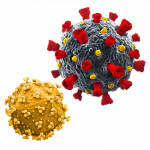The proportion of Swiss people with HIV who report neurocognitive impairment has declined swiftly in recent years, aidsmap reports.
Publishing their findings in Clinical Infectious Diseases, Katharina Kusejko, MD, of the University Hospital Zurich, and colleagues from the Swiss HIV Cohort Study analyzed data on 8,545 people with HIV who completed five or more routine neurocognitive impairment questionnaires as part of their routine medical care between 2013 and 2017.
The proportion of the cohort members reporting neurocognitive impairment, including frequent memory loss or difficulty concentrating or reasoning, declined from 20% in 2013 to 11% in 2017. The study authors speculated that this rapid decline might be explained by faster initiation of antiretroviral (ARV) treatment following diagnosis as well as the use of more potent regimens.
Those who reported neurocognitive impairment were older, more likely to be female (31% of those who reported such impairment were female compared with 28% of those who did not report it), have a history of injection drug use (18% versus 9%), have been diagnosed with an opportunistic infection of the central nervous system (6% versus 3%), have a history of depression (46% versus 23%) and report imperfect adherence, as measured by missing at least one dose weekly (16% versus 10%).
Comparing the 80% of the cohort members who had little or no evidence of neurocognitive impairment with the 7% who had persistent impairment, the researchers found that having a previous opportunistic infection of the central nervous system, reporting imperfect ARV adherence and having a history of depression were associated with a 3.9-fold, 3.1-fold and 1.9-fold increased risk of persistent impairment, respectively.
“Patients with these characteristics should be preferentially tested for neurocognitive impairment,” the study authors concluded.
To read the aidsmap article, click here.
To read the study abstract, click here.







Comments
Comments